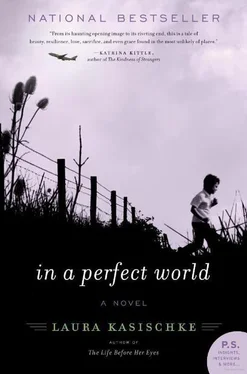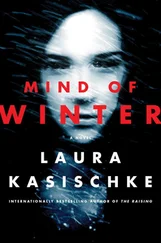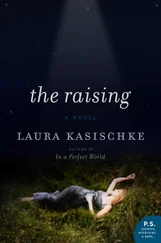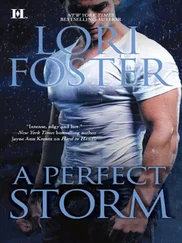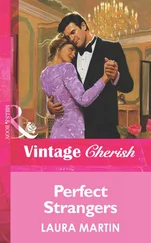They sat back in their places around the bed, Jiselle holding Paul’s hand in one of hers and Camilla’s in the other. Paul and Camilla each held one of Bobby’s hands. When the sun finally broke into the darkness, and the warm light of it seeped over the windowsills and cast the shadows of the bare tree branches against the shades, Paul said, “You need to go.”
Jiselle looked up at him.
The swelling on the side of his face had gone down in the night, and he looked more like the man she remembered, making that brick path with Bobby and Sam in the backyard in the sun. He was not in physical pain. The afternoon before, after Bobby had finally fallen quiet—the screaming and the clawing having subsided into an awesome silence—Paul had left the room and returned with a pair of pliers.
“Please,” he said to Jiselle. “I can’t have this distraction while my boy dies.”
Jiselle followed him into his bedroom, where he’d already spread a towel over the pillows. He’d brought two tennis rackets in from the back porch to hold on to. He said to Jiselle, handing her the pliers, “I sterilized them.” He swallowed. “I passed them through a fire, and I just had a shot of whiskey. I’ll try to be quiet.”
When it was over, Jiselle wiped the blood from the side of Paul Temple’s face with a towel, and the tears out of his eyes with her fingertips, and as she did, he reached up and pulled her down next to him on the bed.
She put her head on his shoulder.
For the first time in two days, for a few minutes there in Paul Temple’s arms, Jiselle fell asleep.
She was reading to Sam the morning the National Guard came to the door. It was the end of November, and it had been snowing all night.
The walls of the palace were formed of drifted snow, and the windows and doors of cutting winds. There were more than a hundred rooms, all lighted up by the aurora, and so large and empty, so icy cold, so —
Everyone else was still asleep.
Four men—boys, really, wearing army-green fatigues, stood outside the front door. Although they were taller and more muscular than Sam, they did not look much older. The same clear eyes, poreless skin.
They’d parked their Jeep in the driveway, and behind them, it looked strangely mechanical to Jiselle, out of place in the snow—primitive, like something cobbled together by a creative but unimaginative people. Prehistoric. They wanted to know if she had a vehicle, too, and, if so, did the vehicle have any fuel?
Jiselle pulled her shawl around her shoulders. A hard wind was blowing across the yard, bending the bare tree branches to the east. One of the boys was wearing gloves without fingers, and Jiselle saw that his fingernails were tipped with blue. There were matching blue circles under his eyes. Looking at that one, Jiselle invited them in, and then she stepped out of the way as they passed, one by one, through the door. She’d just added another log to the fire, and it was pouring warmth into the living room. The soldiers moved toward it as if magnetized.
The power had gone out the week before and hadn’t come back on. Still, Bobby and Paul had stacked enough wood behind the house that Jiselle was hopeful that if she was conservative with it, she could keep the house heated until March, when the weather would surely get warmer, whether or not the power came back on.
She’d stopped assuming that it would.
The boys sat next to one another across from the fire, squeezing together to fit themselves on the couch, and apologized for their boots, which were wet but not dirty—huge black boots laced halfway up their calves, tightly, over olive-green pants. The snow on the soles was melting in clear and shallow puddles around them on the wood floors, but Jiselle said not to worry about it. She’d mop up when they left.
Along with the snow, a scent had been tracked in with them—the smell of burning oil, tarnished brass, old coins and canvas left in a trunk in an attic, taken out again. Industry, travel, commerce, the world. Nothing like the ordinary smells of the house—soap, candle wax, kindling, tea. It would take longer, Jiselle knew, to get that smell of the world out of the house than to mop up the melted snow on the floor around their boots.
“I’m Mrs. Dorn,” she said.
The soldiers nodded to her but didn’t introduce themselves. They seemed stunned into speechlessness by the warmth of the fire.
Sam stood beside Jiselle, staring in appreciative wonder at them. The soldiers nodded at him in unison, kindly—the understanding of soldiers for the great reverence they were held in by boys. Jiselle put her arm around Sam, pulled him closer to her, her shawl around his shoulders, too—although she wasn’t afraid of these soldiers. In her house, in a row on her couch, these were just shivering boys in wet boots.
If they had rifles, they’d left them behind in the Jeep.
Answering their question, she said, “I have two vehicles. But no fuel,” and then, “Would you like some tea?”
Three of the boys glanced for an answer to the one on the end of the couch, who looked no different from the others except that his green cap had two small black stripes glued to the brim. He shrugged at the others, and then at Jiselle. He said, “Sure.”
So Jiselle went to the kitchen, poured water into the kettle, brought it back, hung it on a hook from the tripod over the fire. Back in September, Sam had rigged up the tripod, made from the legs of an old aluminum lawn chair. He’d gotten the idea from an illustration in the Hans Christian Andersen book, in which an old crone had been pictured stirring a pot hanging over a fire from just such a tripod.
“What are the vehicles, ma’am?” the boy with the black stripes on his cap asked.
“A Jeep Cherokee,” Jiselle said, “and a Saab. And also a little Mazda. You’re welcome to them—but, as I said, there’s no gas.”
The morning after Bobby’s death, Paul had insisted that Jiselle take the Saab.
“I filled it up with the last can of gas I had in the garage. It can’t get me to Virginia with one tank of gas,” he said. “And you might need it, in an emergency. If you won’t take it for yourself, think of your children.”
“But we have the Mazda,” Jiselle protested. “And the Cherokee.”
Paul shook his head. “This has gas, and it runs,” he said. He pressed the key into her hand. Its little teeth shone in the sunrise.
“What will you do?”
“I’m walking,” he said, shifting the satchel he was carrying from one shoulder to the next. “I’d be walking before long one way or another.”
“I could drive you as far as—”
He held up a hand, shaking his head. “You might never make it back, whether you had any gas or not.” He didn’t continue, and Jiselle didn’t try to say anything else.
She took the car but had driven it only one time before it too was out of gas. That time had been the morning Diane Schmidt died.
Together, Jiselle and Sara had wound the sheet around her body and carried her to the car, placing her carefully in the backseat. Jiselle drove to the funeral parlor in town, where two ugly women—sisters, surely, with the same fierce jaws and close-set eyes, one of them with a wart on her nose from which a black hair sprouted—demanded two thousand dollars in cash. When Jiselle said she had no cash at all, they reluctantly took her wedding ring and pulled Mrs. Schmidt’s body, without any grace or care at all, out of the back of the car.
From there, Jiselle had gone to find her mother. She had not been able to reach her by phone for a long time. Only once she’d gotten through and heard her mother answer, “This is Anna Petersen,” before the connection was lost again.
Читать дальше
